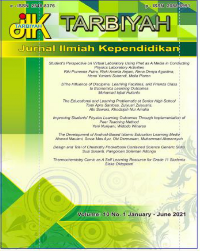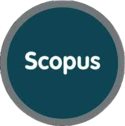Thermochemistry Comic as A Self Learning Resource for Grade 11 Students
DOI:
https://doi.org/10.18592/tarbiyah.v10i1.3869Abstract
The purposes of this development research are: (1) to develop a chemistry comic book in thermochemistry chapter, (2) to evaluate quality of the chemistry comic book based on assessment of chemistry teachers and students at senior high school/islamic senior high school .This research uses procedural model that is a descriptive model. The procedural model contains many steps that we have to follow to launch a product. The development of this chemistry comic book is guided by thesis supervisors, media expert and peer reviewers. The instrument used to evaluate the quality of this chemistry comic book is a set of quality which has some aspects and criteria. The evaluation result is in qualitative data and then the result is tabulated and analyzed by the ideal evaluation criteria category guide to measure the quality of a chemistry comic book. This comic includes 5 sub topics, i.e heat, enthalpy and the change, calculating the change in enthalpy, calorimeter, and fuel. Based on the evaluation converted by 3 chemistry teachers and 6 students, the chemistry comic book developed in this research has a good quality. Based on teachers’ assessment, the chemistry comic book has a good quality, going the score of 146.33 from the maximum point 190 and ideal percentage 77.02%. Meanwhile, based on students’ assessment, it has a good quality, going the score of 106.33 from the maximum point 135 and ideal percentage 78.76%. There it can be used as the guideline of the additional study sources.References
Ahmad, Fadillah. (2018). Pengembangan Media Belajar Komik terhadap Motivasi Belajar Siswa. Jurnal Teori dan Aplikasi Matematika, 2(1), 36–42.
Ambaryani. (2017). Pengembangan Media Komik untuk Efektifitas dan Meningkatkan Hasil Belajar Kognitif Materi Perubahan Lingkungan Fisik. Jurnal Pendidikan Surya Edukasi (JSPE), 3(1), 19–28.
Azhar, Arsyad. (2008). Media Pembelajaran. Jakarta: Grafindo.
Devi Afriyuni Yonanda, Yuyu Yuliati, and Dudu Suhandi Saputra. (2019). Development of Problem-Based Comic Book as Learning Media for Improving Primary School Students’ Critical Thinking Ability. Mimbar Sekolah Dasar, 69(3), 341–48.
Efi Ika Febriandari, Bambang Yulianto, and Wahyu Sukartiningsih. (2016). Pengembangan Media Komik dalam Pembelajaran Model Round Table. Jurnal Kajian Pendidikan dan Hasil Penelitian, 2(3), 297–303.
Fitri Dwi Arini. (2017). The Use of Comic as A Learning Aid to Improve Learning Interest of Slow Learner Student. European Journal of Special Education, 2(1), 71–78.
Nuning Budiarti and Haryanto. (2016). Pengembangan Media Komik untuk Meningkatkan Motivasi Belajar dan Keterampilan Membaca Pemahaman Siswa Kelas IV. Jurnal Prima Edukasia, 4(2), 233–42.
Raymond Chang. (2005). Chemistry.. New York: McGraw-Hill Companies.
Saiful Efendi. (2016). Pembuatan Komik Super Jamu. Jurnal Pendidikan Seni Rupa, 4(3), 365–73.
Shannon Casey. (2006). The Place for Comics in Science Education. USA: Greenwood Publishing Group.
Teni Nurrita. (2018). Pengembangan Media Pembelajaran untuk Meningkatkan Hasil Belajar Siswa. Jurnal Ilmu Tarbiyah, 3(1), 171–87.
Utami Sulistya and A.K. Projosantoso.
(2019). The Development of The Character-Based Science Comics Learning Medoia to Improve Self Reliance Learning the Students of SMP. Journal of Science Education Research, 3(1), 52–62.
Published
How to Cite
Issue
Section
License
Authors retain copyright and grant the journal right of first publication with the work simultaneously licensed under a Creative Commons Attribution 4.0 International License that allows others to share the work with an acknowledgment of the work's authorship and initial publication in this journal.




